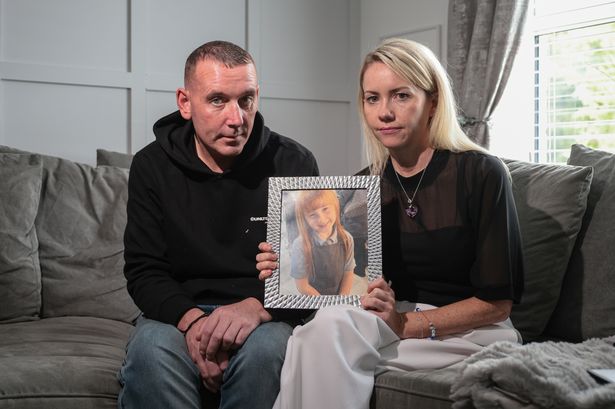Lila Marsland was found dead aged just five, hours after her family were told she had tonsillitis
06:16, 16 Oct 2025Updated 06:28, 16 Oct 2025
 Darren (L) and Rachael, parents of Lila Marsland, who died of meningitis, hours after being discharged from Tameside Hospital(Image: Kenny Brown | Manchester Evening News)
Darren (L) and Rachael, parents of Lila Marsland, who died of meningitis, hours after being discharged from Tameside Hospital(Image: Kenny Brown | Manchester Evening News)
The mother of a five-year-old girl who died hours after being sent home from hospital has slammed the government’s ‘copy and paste’ statement following the tragedy.
In December 27, 2023, Lila Marsland’s family were told by doctors at Tameside General Hospital she had tonsillitis before she passed away from meningitis just hours later.
This June, a coroner wrote to Health Secretary Wes Streeting having published a prevention of future deaths report – which are sent to relevant authorities to attempt to stop further deaths from issues uncovered during inquests.
Coroner Chris Morris told Mr Streeting he was ‘concerned’ about how ‘vital clinical information’ could risk ‘being lost’ in a complicated ‘mixture of various analogue and digital systems’ in use at Tameside General.
Join the Manchester Evening News WhatsApp group HERE
His fears around missing medical information include that ‘no medical record appears to exist of the examination of Lila which was undertaken by the locum registrar in paediatrics which resulted was discharged from hospital’.
Mr Morris also aired serious concerns for the rest of the country’s hospitals which ‘continue to operate with information being stored and shared in a fragmented and disjointed way’.
This, he feared, could have the same fatal consequences.
 Lila Marsland was found unresponsive by her mum Rachael(Image: Family handout)
Lila Marsland was found unresponsive by her mum Rachael(Image: Family handout)
Minister of State for Secondary Care, Karin Smyth, who holds the brief for data and technology in the NHS, responded to the coroner last month.
But Lila’s mum, Rachael Mincherton, said she has been left appalled by the reply.
“I’m so annoyed with the response,” Ms Mincherton told the Manchester Evening News. “At the inquest, the coroner raised the concerns about what happened when I took Lila in.
“We were seen in A&E and those notes were recorded on an electronic system. Then we went to paediatric A&E, where the notes were all recorded on paper.
“Then the medical handover sheet which listed that the advanced nurse practitioner feared meningitis was never given over to the doctor, the doctor never saw that.
“What she’s written doesn’t really address anything to do with Tameside Hospital. She speaks about what’s happened [nationally] since 2022, and how much money they’ve pumped into the system.
“The minister said the government is going to work with secondary [hospital] trusts and NHS England to look at the areas of improvement, but she doesn’t really expand on what’s being done there.
“She mentions maternity deaths, which is quite a hot topic at the moment with all the maternity scandals, but there’s nothing about paediatric care. How’s it going to prevent anything happening? That’s the whole point of the prevention of future death reports.
“It’s as though she’s copied and pasted some of that.”
 Lila Marsland with her mum and sister Ava(Image: Submitted)
Lila Marsland with her mum and sister Ava(Image: Submitted)
The brief letter mentions a health watchdog inspection of Tameside General, saying it was recently given a ‘good’ rating. But the minister does not address what went wrong at the hospital in Lila’s care, or how those problems have been resolved.
The response goes on to address ’information being stored and shared between professionals in a fragmented and disjointed way’, ‘recorded on a mixture of analogue and digital systems in operation in different parts of the trust’.
“I agree that ensuring health and care professionals have access to a single source of digital information about the patients they are treating and caring for is vitally important to delivering the best care possible,” said the minister.
The minister says that, since 2022, £1.9bn has been invested in digital transformation across the health and care system, including ‘rolling-out electronic patient records (EPR) to NHS trusts that don’t have one, and supporting those with an existing one to replace, extend or optimise it’.
The electronic patient records are intended to make all medical notes digital, so they can be accessed by any staff looking after a patient.
The letter adds: “Currently, 93 per cent of secondary [hospital] trusts have an EPR in place, we expect 96 per cent of trusts to have EPRs by March 2026, with the remainder to follow.”
Rachael said she fears the errors that could arise from different trusts using different digital systems, and that electronic records might not be easily transferrable if a patient like Lila has to be moved to a different hospital trust to be treated.
The minister says this will be mitigated by a new single patient record system which can be used by all trusts for each patient, rolling out in three years.
 The primary school pupil was told she had tonsillitis, was given oral antibiotics and was discharged
The primary school pupil was told she had tonsillitis, was given oral antibiotics and was discharged
Lila started getting sick on December 27, 2023.
By the evening, Lila’s mum – a district nurse who worked for Tameside and Glossop Integrated Care NHS Foundation Trust – knew it was serious enough to take her daughter to the trust’s A&E at Tameside Hospital.
The youngster was suffering headaches, a sore throat, a high heart rate, neck pain and limited neck movement, vomiting, lethargy and was unable to pass urine.
Lila was sent from adult A&E to paediatric A&E. Mum Rachel asked hospital staff if it was meningitis.
A number of nurses were concerned this was a possible cause for Lila’s illness but, following tests and a review by an experienced paediatric registrar doctor, decided she was more likely suffering from tonsillitis.
The five-year-old was discharged from Tameside Hospital with antibiotics and a throat spray at around 2am on December 28. Around eight hours later, she was found unresponsive in bed by her mum.
She has also been left confused that Lila’s case did not receive a response from the health secretary.
“I was expecting to get the response from Wes Streeting because it was sent to the health secretary. He passed it on to the data minister, which I don’t quite understand,” she said.
 The family has been left devastated after Lila’s fatal meningitis failed to be diagnosed amid a host of failures by the hospital
The family has been left devastated after Lila’s fatal meningitis failed to be diagnosed amid a host of failures by the hospital
A Department of Health and Social Care spokesperson responded, saying: “Our deepest sympathies are with Lila’s family following their devastating loss.
“This government is determined to make sure that mistakes made in the past are not repeated.
“Through our 10 Year Health Plan, we are investing £2 billion in technology to take the NHS from analogue to digital and bolstering patient safety, including through the rollout of the Electronic Patient Record to ensure information can be transferred seamlessly between health teams.”
Following an inquest at the start of June, which examined the Hyde girl’s care and treatment at Tameside General Hospital, a jury concluded her death was preventable and ‘contributed to by neglect’.
“Had Lila been admitted to hospital and given broad spectrum antibiotics within the first hour of being triaged, this would have prevented Lila’s death,” the jury concluded.
The Greater Manchester South Area Coroner produced two ‘prevention of future deaths’ reports.
Coroner Chris Morris told the Secretary of State for Health and Social Care: “The court heard evidence that, over the course of almost 10 hours in hospital, Lila’s history and details of examinations and assessments undertaken were recorded on a mixture of various analogue and digital systems in operation in different parts of the trust, leading to a risk of vital clinical information being lost in the system.
“I am concerned that this, and other hospitals elsewhere in the country, continue to operate with information being stored and shared between professionals in a fragmented and disjointed way.”
Join our Court and Crime WhatsApp group HERE
Along with his letter to Mr Streeting, the coroner also wrote to the bosses of Tameside and Glossop Integrated Care NHS Foundation Trust raising fears about its lacking implementation of the National Institute for Health and Care Excellence (NICE) guidance around meningitis, and notes missing from Lila’s case.
The absent notes include a record of the final review of Lila by a senior paediatric registrar before she was fatefully discharged.
The coroner’s prevention report aimed at trust bosses read: “I am concerned that no medical record appears to exist of the examination of Lila which was undertaken by the locum registrar in paediatrics which resulted was discharged from hospital.
“The absence of this key piece of evidence serves to limit the ability of the trust to derive all possible learning from Lila’s death.”
Mr Morris, too, aired concerns that an emergency medicine consultant who approved Lila’s transfer from adult to paediatric A&E ‘provided a statement to this court that they had seen’ Lila ‘and ‘visually assessed [her] at least’.
When called to give evidence in court during the inquest, the consultant admitted this had not happened.
The trust has apologised and accepted there were failings.
Ms Mincherton, outside court, said: “I would like to thank the jury for coming to this conclusion, based on the evidence provided – a conclusion I have known for 17 months.
“Hearing the word ‘neglect’ is something a parent should never have to hear and we are now left with the devastating loss of our daughter for the rest of our lives.”
